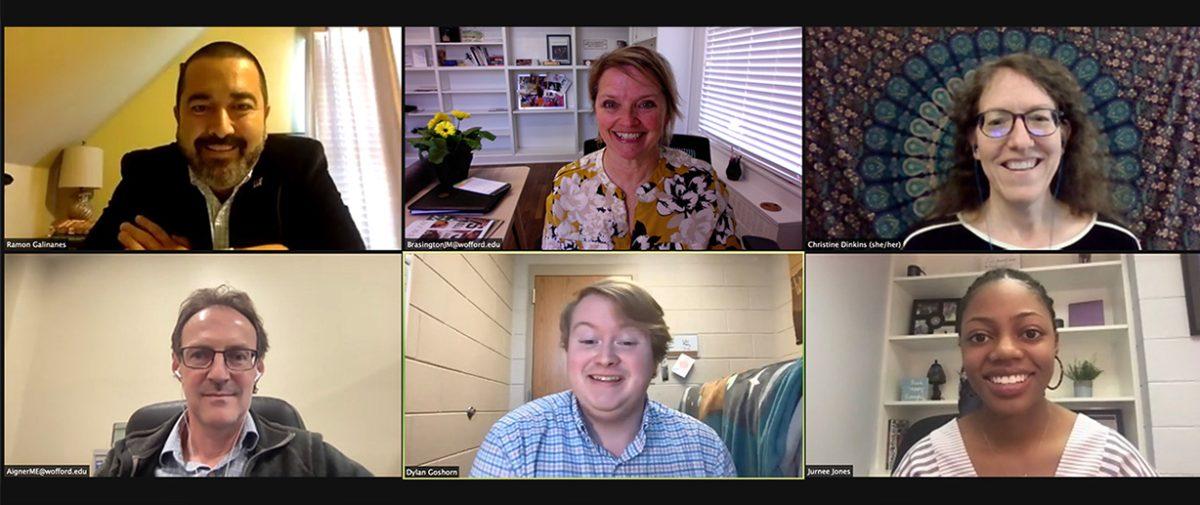Recapping the preliminary report town hall
Wofford’s Justice, Equity, Diversity and Inclusion (JEDI) Committee held a town hall Zoom meeting to share its progress on March 11. Members of the committee discussed initial findings, recommendations for the school and goals for the future.
The committee is divided into five working groups: History, Memory and Place; Curriculum, Teaching and Advising; Student Life; Enrollment, Recruitment and Marketing; and Policies, Procedures and JEDI structure.
The groups began the year with research about justice, equity, diversity and inclusion on campus. They presented this data to the Board of Trustees in February and then to the town hall in March. Currently, the committee is finalizing a strategic plan and vision to be presented to trustees in May.
Research included surveys with over 390 responses and over 46 listening sessions.
In the town hall meeting, members of the committee shared some of the recommendations they will make to the Board of Trustees. Recommendations vary from increasing budgets and staff for Wofford’s Office of Diversity and Inclusion (ODI) to joining the Universities Studying Slavery Consortium.
The committee also recommends that Wofford recognize the foundational efforts from under-represented groups through plaques, markers and other displays.
Apparent from the town hall meeting was alumni engagement with Wofford’s past, present and future with systemic racism. Several questions came from alumni before the meeting and through Zoom’s “Q&A” feature. These questions were to be answered in email format after the meeting.
“We’ve been really grateful for the support we’re getting from not just the president and the board but also all the faculty and staff and students and the alumni as well,” Christine Dinkins, William R. Kenan, Jr. Professor of Philosophy, said, “One thing that has really come out in our listening sessions and surveys is that alumni who have lots of different points of view are all willing to take the time to participate and let us hear from them.”
Ramón Galiñanes, Director of undergraduate research and post-graduate fellowships, also noted strong alumni involvement, especially between those who graduated from Wofford in the 1960s and 1970s as well as recent graduates. He said that alumni perspectives on JEDI range from critical to encouraging.
“People are very passionate about Wofford,” he said. “People have strong views about Wofford and people want to be right, and that is a testament to the sense of connection they have to Wofford. But that’s also challenging when you have people with all sorts of views from all different angles.”
Galiñanes believes that, in order to grasp where Wofford is in anti-racism work, being on campus and interacting with the Wofford community is crucial.
“I think folks who are on campus have a better understanding,” he said. “Folks who are only reading little blurbs about what’s happening… I think there’s more complexity to it. I felt that the JEDI process was an opportunity to have a conversation so that there is a better understanding.”
Along with alumni engagement, Dinkins emphasized that JEDI’s work builds on the work of other organizations on campus, specifically mentioning the leadership of Dean Taifha Alexander with the Office of Diversity and Inclusion.
“We always want to amplify the work that’s going on and acknowledge that we’re very much benefitting from that work,” she said. “The part that really moved me is that students and alumni who have had really not the happy, consistent experience that a lot of our other alumni had are still willing to say, ‘I value Wofford; it gave me a lot, it gave me an education.’”






























